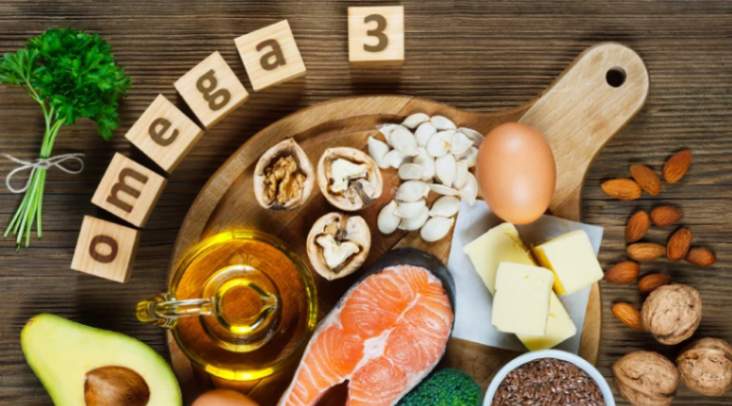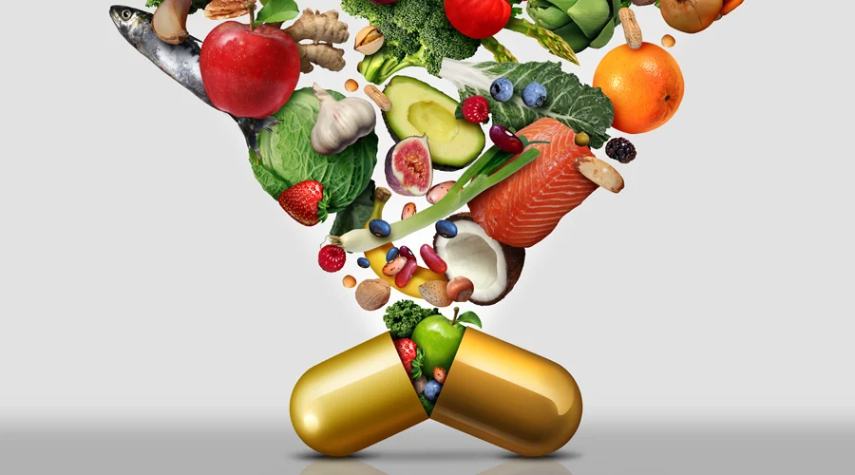While vitamins and minerals play key roles in a healthy diet, the same holds true for nutritional co-factors that do not fall into those categories. These “other” nutrients are also important for vibrant health, and while some are easier to recognize than others, the benefits of certain non-vitamins and non-minerals should not be overlooked. That’s why we put together a list of botanicals, nutritional molecules, and food nutraceuticals that can positively impact a variety of key mechanisms throughout your body. Each one of these ingredients — from Astaxanthin to Resveratrol — can play a role in your daily health.
1. Astaxanthin
Astaxanthin is found in ocean dwellers such as shrimp, crayfish, krill, and salmon. It is often used in dermatology practice due to its anti-inflammatory and antioxidant capabilities, and with mounting evidence backing the benefits of this nutrient, it’s safe to mention how said capabilities helps keep your skin healthy.
Astaxanthin is considered one of nature’s top antioxidants. Studies have shown that it can be up to 6,000 times more powerful than Vitamin C for quenching singlet oxygen molecules — making it a powerful defender of cells and body tissue against the oxidative stress caused by free radicals. Considered the “King of Carotenoids,” Astaxanthin also lends its antioxidant power to cardiovascular function, energy and physical performance, and even cognitive function. For a deeper dive into Astaxanthin, you can read more in an article titled “All The Things Astaxanthin Can Do For You.”
2. Ashwagandha
Feeling stressed, worried, or anxious? Ashwagandha may very well solve your woes. This nutrient started as a plant and made its way into ancient medicine thanks to its anti-anxiety effects. Studies have shown Ashwagandha, and adaptogen, may reduce the effects of stress and fatigue in humans. This nutrient is also referred to as “Indian Winter Cherry” because of its importance in Ayurveda, the traditional medicine system of India.
In addition to its stress management capabilities, Ashwagandha may help with cognitive function and even provide antioxidant protection.
Because Ashwagandha is a plant, it’s quite difficult to find sources of this nutrient in food. Fortunately, there are supplements that come in the form of a powder or pill that contain Ashwagandha. You can go on the trail to learn more about this amazing root in an in-depth look at Ashwagandha harvesting by Chris Kilham – The Medicine Hunter®.
3. Collagen
A major component and building block of your bones, skin, muscles, and ligaments is Collagen. In fact, Collagen accounts for a staggering 30% of total protein mass in the human body. Think of this nutrient as the “glue” for your bones — it is essential for healthy connective tissue and important for skin strength and elasticity.
Back in 2015, the Journal of Medical Nutrition & Nutraceuticals published a study that highlights the effects a supplement containing Collagen — along with vitamins, minerals, and Hyaluronic Acid — had on skin elasticity and wrinkles. The research concluded that the supplement led to a significant improvement in skin elasticity and wrinkle depth.
Collagen is found in a number of different sources. For starters, an intake of Vitamin C through foods such as fruits, peppers, meats, and beans can stimulate your body to naturally produce Collagen. However, as we age, natural production of this nutrient becomes increasingly difficult. That’s why it is important to feature Collagen in your diet — even during your younger years. Check out “Some Important Facts About Cellulite, Collagen, and Beautiful Skin” for more information on Collagen.

4. CoQ10
Coenzyme Q10 is produced naturally in the body, but can also be found in external sources. CoQ10 is involved in vital processes within the heart, liver, pancreas, and kidneys, and is considered one of the most important nutrients. According to the National Center for Complementary and Integrative Health, CoQ10 may assist in the prevention of migraines, but this idea is backed by only a limited amount of evidence.
What we do know, however, is that CoQ10 serves as an antioxidant your body uses to promote cell growth and cell protection. It’s a good thing your body naturally produces CoQ10 when it comes to protecting your cells against harmful oxidation damage. That being said, the natural production of antioxidants may help improve energy throughout the body, which leads to more stamina and vitality for you!
CoQ10 is present in common food sources such as tuna, salmon, and whole grains. Over time, the human body loses some ability to produce this nutrient in a natural manner. This makes it all the more important to maintain a diet that includes CoQ10. To further your knowledge on Coenzyme Q10, turn to “CoQ10: The Supplement Every Senior Should Be Taking.”
5. Creatine
Creatine is perhaps the most well-known nutrients on this list. That’s because its commonplace in the supplement aisles of big-box stores, in the gym, and even in your own body. That’s right — Creatine is naturally produced in the human body but can be utilized in a more efficient manner in supplements. This powerful amino acid works hand-in-hand with protein to provide strength during workouts and more muscle repair when finished. This nutrient is popular among frequent gym-goers and others who enjoy engaging in physical activity. Creatine is backed by over 300 clinical studies that focus on the effects it has on physical activity. An eye-opening 70% of these studies suggests Creatine generates significant performance results.
Plus, Creatine is present in the brain and supplementing with Creatine can support healthy brain function. Yes — your mind can be your most powerful muscle!
Dietary sources of Creatine come in a variety of supplements in the form of powder, pills, and even chewable gummy vitamins. Food sources that are high in Creatine include fresh beef, red meat, and dairy products. For reference, 1 lb. of beef contains 5 g., while 1 lb. of red meat checks in with about 2 g. of Creatine. To further your knowledge of Creatine, check out the article titled “Can Creatine Do More Than Just Make You Strong?”
6. Curcumin
Next up on the list of the top nutrients for vibrant health is Curcumin. This particular nutrient comes from the root of the Turmeric plant and serves as the main active ingredient in a spice that holds the same name. Curcumin is used around the world and has the ability to take on many different forms. India includes this nutrient in curry recipes, Japan adds it to tea, and Pakistan deems it worthy to use as an anti-inflammatory remedy. In the United States, Curcumin acts as a preservative in popular stack foods like chips and cheese. Curcumin also acts as an antioxidant mechanism and has shown to improve oxidative stress to clear our free radicals in the body.
Curcumin has grown in popularity in supplements that focus on joint health, cardiovascular health, brain function, and reducing inflammation. For more on this ancient and versatile spice, read Spotlight On Curcumin: The Spice Of Life.
7. Fiber
A Fiber-rich diet offers a variety of benefits that impact quite a few key areas of daily health. This nutrient helps food run through your intestines more smoothly to promote regularity throughout the body and prevent constipation. Fiber helps you feel “full” — which is a key aspect of maintaining healthy weight.
Coronary health is an additional benefit of Fiber, according to Intermountain Healthcare. This nutrient acts an anti-inflammatory throughout the body, most notably in the heart.
Food sources that are high in fiber include whole grains, nuts and seeds, and fruits and vegetables. Both the apple and avocado provide over 4 g. of fiber, while 1 cup of chickpeas pack 16 g. per serving. After reading this section about Fiber, you may ponder if you’re getting enough of this nutrient. The article titled “Are You Getting Enough Fiber?” may help formulate an answer to your question.
8. Grape Seed Extract
Developed in the 1970’s, Grape Seed Extract has become a trusted nutrient in dietary supplements throughout the United States. This nutrient has been studied for a variety of health conditions and is known to promote wound healing and reduce inflammation. An interesting tidbit of Grape Seed Extract is that it can lower blood pressure and heart rate – a key factor when reducing inflammation.
Grape Seed Extract is made from, well, grapes! In this case, however, those same grapes used to make wine are dried into a powder that can be blended into a delicious and nutritious smoothie. Similar to other nutrients on this list, Grape Seed Extract is found in vitamins in the form of powders, pills, and other supplements. For additional information on Grape Seed Extract and the role it plays in skin care, you can go to “The 6 Pillars Of Smart Nutrition.”

9. Green Tea
Perhaps one of the most loved beverages in all the world, Green Tea provides a great-tasting drink that is naturally free of sugar, while still containing some of the caffeine that people often crave (though half that off coffee). Harvard Health also noted that green tea contains many nutrients that are good for the heart.
Green Tea consumption offers support for your blood vessels when exposed to physical and emotional stress, by helping to improve the reaction to stress by the blood vessels in a process known as vascular reactivity.
A common trend in vital nutrients are their anti-inflammatory properties, and Green Tea is another botanical that continues this trend. Studies show Green Tea reduces inflammation throughout the body, perhaps mainly due to the action of its EGCG (epigallocatechin-3-gallate) content. This same EGCG component has also been tied to green tea’s ability to help people lose weight and body fat.
Green Tea is gaining popularity and can be found in stores tall over America. If you’re looking for a healthy source of this nutrient, try to avoid the sugar-laden Green Tea formulas, some of which pack in as much as nine teaspoons of sugar per serving that will wipe out the health benefits of the beverage. Some tips on how Green Tea may keep your heart healthy can be found here.
10. Hyaluronic Acid
A common trait among some of nutrients found in this list is the human body’s ability to create them on their own — and the equally common trait to create less and less of them as we age. Hyaluronic Acid is no different. Similar to Collagen, this nutrient is an important molecule that helps prevent skin aging. Hyaluronic Acid, or H.A. for short, retains the water in human skin to maintain moisture and natural glow. H.A. is found in the skin, eyes, and joints and carries the same hydrating, lubricating, and cushioning capabilities in each area of the body.
It is clear Hyaluronic Acid is one of the most versatile nutrients on this list. A notable benefit of H.A. is its ability to promote youthful skin and joints in your body. You can check out “How Hyaluronic Acid Gives You Youthful Joints And Skin” for further information regarding the “Molecule of Youth”.
11. Lutein
This next nutrient plays a key role in preserving vision and general eye health. Lutein is a carotenoid primarily used to support eye health — especially as the body ages. Lutein is backed by evidence that shows the positive effects it may have on eyes, including the ability to improve macular degeneration, a leading cause of vision impairment. It’s important to provide your body with enough Lutein in order to protect your eyes from those dreaded free radicals produced in oxygen and light. Plus, Lutein has grown a reputation for being able to block blue light waves from penetrating the eyes. These blue light waves — which come from many artificial sources including cell phone and computer screens as well as LED bulbs — can harm the structure of the eye and cause problems with sleep patterns and mood as well.
And now, studies are beginning to show how Lutein can be a key ingredient for skin care, even as an oral supplement. Blue light waves can also cause harm to the skin. Plus, Lutein has shown the ability to help hydrate the skin from the inside out.
The major source of Lutein are marigold flowers. But people don’t usually eat marigolds! Food sources that contain Lutein include kale, cooked spinach, and broccoli. Kale and spinach consist of over 20 mg per cup and broccoli has just over 2 mg per cup. Lutein certainly does its part to protect your eyes from free radicals. Once you hit the middle stages of your life, this nutrient becomes all the more important. You can greater your knowledge of Lutein by reading “How To Support Your Vision Health After The Age Of 50.”

12. Omega-3
According to The National Institutes of Health, a steady diet rich in seafood, specifically fish and shellfish, can lower chances of heart disease compared to those who fail to include fish in their diet. This is the second vital nutrient found in marine environments, the first being Astaxanthin. Omega-3 may reduce the risk of heart disease because it helps lower blood pressure and keep it at a healthy level. Another coronary-related benefit of Omega-3 is plaque prevention in arteries, as well as its positive effects on cholesterol levels and triglycerides in the blood.
Omega-3 is vital for health because it contains essential fatty acids that your body cannot produce on its own. Multiple clinical studies show that the EPA, DHA, and DPA in Omega-3 can not only help support heart health, but joint comfort, brain function, and mood as well.
Seafood is a great source of Omega-3, with salmon, sardines, and anchovies leading the way. Three-ounces of Atlantic salmon provides a hearty 1,900 mg, sardines bring in 1,500 mg, and anchovies offer 1,200 mg of Omega-3. Seek out more support for your heart through Omega-3 with help from “The Best Omega-3 Fatty Acid Sources For Heart Health.”
13. Probiotics
There are good germs and then there are bad germs. Fortunately, we’re going to focus on the good germs. The National Center for Complementary and Integrative Health states that Probiotics contain microorganisms, the most common of which are bacteria that helps digest food, help prevent harmful cells from making you sick, and produce vitamins. As a result, Probiotics can help strengthen your body’s immune system to fight against infections and diseases.
Probiotics are found in yogurt and other dairy-based supplements. Yogurt is stacked with bacteria that is beneficial to your health and well-being. Pickles are another food source that provides healthy probiotic bacteria, both of which are great for digestion and immune support. “How To Pair Probiotics & Prebiotics For A Happy Gut” is your guide to maintaining gastronomical health.
14. Phytonutrients
Plant-based foods contain more than 100,000 Phytonutrients — found in notable fruit including blueberries, tomatoes, and citrus — are naturally produced by plants. Although Phytonutrients help protect fruits and vegetables that are still developing, they also benefit humans by providing antioxidant action throughout the body. These super-nutrients provide protection for the cells in your body and are very easy to consume. An added benefit of these Phytonutrients is immune support, which plays a role in the body’s fight against diseases. Simply put, the study published in the Journal of Complementary and Integrative Medicine Phytonutrients to have an “important role in human health.”
Phytonutrient-rich foods include carrots, sweet potatoes, and peaches — in addition to the aforementioned blueberries, tomatoes, and citrus. You can go to the article titled “What Are Phytonutrients & Why Are They So Important?” to expand your knowledge of these essential nutrients.
15. Resveratrol
The final top nutrient for vibrant health is Resveratrol. Although this particular nutritional co-factor may not sound familiar to many, it packs quite the punch when it comes to the benefits of human health. Two primary benefits are Resveratrol’s antioxidant capacity and its ability to lower high blood pressure. In turn, Resveratrol holds a role in cell protection and heart health.
Resveratrol is relatively easy to find in food sources, as grapes, peanuts, and even wine all provide the consumer with this nutrient. Studies show that red wine can fight the decline of cognitive function, thanks to the levels of resveratrol found in this beverage. Check out “Nutrients For Thought: Your Guide To Brain Health” for more tips on how Resveratrol helps protect your brain.

How To Get The Best Out Of The “Beyond Vitamins” Nutrients
Now that you’ve read up on the top botanicals and nutritional co-factors for vibrant health, it’s important to familiarize yourself with the idea of actually getting these ingredients in supplements, juice cleanses, and more. Like vitamins, these important nutrients — while healthy and, in some cases, required for your wellbeing — should be consumed responsibly at all times.
For instance, think about Creatine and the muscle-building characteristics it provides to your body. This particular nutrient has been deemed a “phenomenon” in the bodybuilding and active lifestyle community — and deservedly so! However, you want to make sure you are getting your Creatine from a trusted source that has verified its purity and potency. There are too many cut-rate brands of Creatine available online and in stores these days.
Imagine yourself scanning through a whole row of supplements in your favorite store. More often than not, the very first action you take is to read the label to understand what exactly what will be going into your body. This hold true for any of the aforementioned nutrients —Green Tea, Lutein, Omega-3, Creatine, and so on. Pay close attention to forms, dosage levels, and “other ingredients.”
For the sake of this idea, we’ll stick with Creatine. You’ll notice the supplement or juice in question doesn’t exactly load itself with this nutrient because too much of it is simply a disservice to your body — but too little of it will not necessarily get you the benefits you are looking for. You want to follow the science and make decisions based on evidence and research. So make sure to read each label carefully and consume the ingredients in a safe and responsible manner!
Sources
https://www.ncbi.nlm.nih.gov/pmc/articles/PMC5946307/
https://www.ncbi.nlm.nih.gov/pmc/articles/PMC6979308/
https://www.ncbi.nlm.nih.gov/pubmed/28471731
https://www.nccih.nih.gov/health/coenzyme-q10
https://www.ncbi.nlm.nih.gov/pubmed/12701815
https://www.ncbi.nlm.nih.gov/pmc/articles/PMC5664031/
https://www.nccih.nih.gov/health/grape-seed-extract
https://www.health.harvard.edu/heart-health/brewing-evidence-for-teas-heart-benefits
https://www.ncbi.nlm.nih.gov/pubmed/27634207
https://www.ncbi.nlm.nih.gov/pubmed/26093535
https://www.ncbi.nlm.nih.gov/pmc/articles/PMC3583886/
https://www.health.harvard.edu/blog/the-hype-on-hyaluronic-acid-2020012318653
https://www.ncbi.nlm.nih.gov/pmc/articles/PMC6164534/
https://www.ncbi.nlm.nih.gov/pubmed/22465791
https://www.ncbi.nlm.nih.gov/pmc/articles/PMC5063591/
https://www.nccih.nih.gov/health/tips/things-to-know-about-omega-fatty-acids
https://www.ncbi.nlm.nih.gov/pubmed/16531187
https://www.ncbi.nlm.nih.gov/pubmed/22371413
https://www.nccih.nih.gov/health/probiotics-what-you-need-to-know









